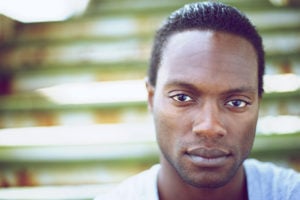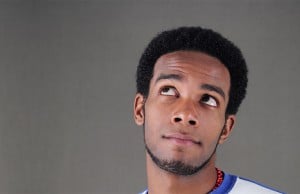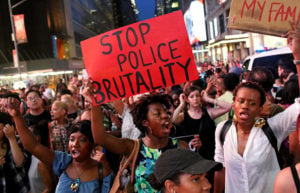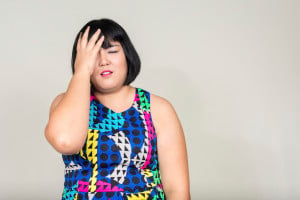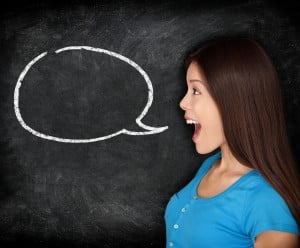In a heated discussion in the office after the recent presidential election, everyone in the meeting was on edge.
“I voted for Trump,” Lucy finally admits to her boardroom of Hillary-supporting colleagues.
Everyone in the room becomes enraged.
After Lucy explains why she supports Trump, the co-owner of the company responds, “As long as she knows that a vote for Trump is a vote for a racist.”
“I’m a racist? I’m a racist? I’m a racist?” Lucy yells in protest.
“Please don’t say it!” the black employees respond, predicting her next reply will be the typical response white people use when they are called racist.
“I have black friends!”
“Oh my God. She said it.”
“They’re real! They’re real!” Lucy insists.
This moment in a recent episode of TV show Black-ish addresses a phenomenon that occurs when white people are called racist.
“I’m not racist. I have black friends,” they’ll argue. Or they’ll say, “My black friends let me say it,” if someone calls them out for saying the n-word or some tacky racist joke.
This argument is deeply flawed because it doesn’t get to the heart of what is means to be racist or anti-racist.
If you’ve ever used your black friends to try and pardon your racism, you need to understand these three reasons why “I have black friends” is not a legitimate argument.
1. Even Donald Trump Has Black Friends
There you have it, folks.
I really need not continue this article any further.
Then again, there are a few black people who are capable of standing next to Trump without dying of shame, so I can’t assume we’re all on the same page here.
Donald Trump is a racist.
Need proof? No worries. I’ll spell it out.
Although his wife and mother are immigrants, he signed executive orders to ban certain immigrants from entering the US, and he’s constantly threatening to build a wall between the US and Mexico. The only immigrants he’s targeting are the brown ones.
Despite ongoing issues with police brutality, Trump signed executive orders to expand the power of the police. Many worry that these policies will decrease police oversight and accountability.
Who will these policies harm the most? Again, brown people. Black, Indigenous, and Latinx people who experience the highest rates of police brutality, to be specific.
Of course, we can’t forget that he ran his campaign on a racist platform to Make America White—I mean, “Great.” I don’t want to revisit that shitshow. If you need further proof, get it here.
Yet, some black folks still run behind him, let him kiss their precious babies, and pretend that they’re “the bridge” between the presidency and the people. The rest of us are scratching our heads in disbelief and denying that we ever knew those misguided black folks.
Clearly, black people aren’t a monolith.
We don’t all agree on everything. We don’t have a black people conference where everyone calls in to discuss how we’ll all feel about the election, the first black Bachelorette, or whether or not so-and-so’s new white friend they met at work gets the “Black seal of approval.”
There is no official black seal of approval.
I wish there were. It would help when going to job interviews and interacting with the police if people of color could know up front who their allies are. Unlike those safety pins, this seal of approval isn’t self-appointed, but bestowed upon true allies who earn the title. Alas, there’s no way to do this.
Without a “this white friend is not a racist” screening, we can’t detect whether or not a white person is a racist based on the company they keep.
For all we know, your black friend could be like Steve Harvey, Ben Carson, or Kanye West, who overlook Trump’s racism. Your black friend may allow you to be racist.
There are many reasons a black friend would do this. Maybe you’re a nice person, so they don’t care that you say some racist things. Maybe they aren’t fazed by the n-word, so they let you say it. Maybe your black friend has a personal struggle with internalized racism.
Maybe they don’t feel comfortable calling you out on your racism because they don’t want to have that difficult conversation. Ugh, that conversation is always difficult.
And if we’re being honest, some of those “black friends” claims might not even claim you.
I can think of one or two white associates who count me as their one black friend. I probably wouldn’t be able to point them out in a lineup. Okay, fine. I might recognize them on a good day, but I’m certainly not bailing them out.
My funds are reserved for people who I speak to outside of obligatory circumstances, not the people I’d describe as, “Who, Rebecca? Yeah, I think we had a class in college together. They’re cool or whatever.”
Next time someone tells me they’re not racist because they have black friends, I’m going to challenge them. “Oh, yeah?” I’ll say. “Call them on the phone right now. I want to speak to them.”
I’ll make things uncomfortable. But you started it with your unapologetic racism. So I’ll tell your black friend that you’re using them as an excuse to be racist.
And don’t try to play me, either. Like many (but not all) black people I have a special power to recognize another black person on the phone.
We can even spot those who’ve been told they speak “like a white person” because they have a certain something that gives it away.
2. Not Being Racist Requires More Effort Than Associating with Black People
Many white people don’t understand what racism has to do with them. They say, “I’m not a racist,” or “I didn’t cause slavery,” or “I’m just one person who doesn’t have anything to do with racism.”
You are one person. You are one person who, like everyone else, is part of a system in our society. In this system, there are the haves and the have nots. White people, guess which one you are.
Both, probably.
Most of us experience both privilege and oppression in intersecting ways.
Though you’re white, you may also be working class and struggling financially because our society tends to benefit those who already have money.
You might be disabled and fighting to gain access to resources (even those resources guaranteed under ADA Law) because our society was set up to service able folks.
You might be a woman and/or a trans person who constantly bumps up against glass ceilings at work because the law justifies a workplace that favors cis men.
The kyriarchy – the system that upholds intersecting form of oppression and encompasses racism, sexism, ableism, hetero- and cis-normativity, classism, and more – is a bitch. We’re all trying to survive and make things better.
So let’s focus on that “make things better” part.
While many of us are oppressed in various ways, we also have privilege. We can use this privilege to make things better by helping dismantle systems of oppression in our daily lives.
In your case, your privilege is whiteness. Whiteness allows you access to a particular treatment in society that people of color don’t have. The systemic racism in our society allows white people to benefit from being white at the expense of people of color.
Your white privilege means that you’re more likely to get the job, while a qualified Latinx applicant doesn’t get an interview. Your white privilege means you’re less likely to get “randomly selected” when going through airport security.
It means you’re more likely to get a lesser sentence for a crime that a black person gets much more time for. It means you can likely walk through your neighborhood without being profiled as a robber.
You benefit from racism. Don’t believe me? Check out this article, this one, and this cartoon. Seriously, read that information, because it’s crucial to understanding your place in our society.
The concept of systemic racism often catches people by surprise. We grow up learning that racism is when people do bad things because of skin color. That’s only a fraction of the story.
Racism runs deep in our government, our criminal justice system, our hiring practices, our educational system, and our financial institutions.
Yet, you can do something about it. You must do something about it. The system is powerful partially because those who benefit from it sit back and let it happen.
You wonderful white friends get to be disruptors of this systemic oppression by using your white privilege to stand against it.
To do this, you can copy the anti-racist methods of my favorite white friend, Jac. She often explains to her friends and family why their racist thinking isn’t okay. She also pressures the human resources department at her job to diversify the staff.
And, in her spare time, she reads articles about race to deepen her understanding of racism in our society.
I’d bail Jac out of jail in a heartbeat (likely she’s there because she got arrested at a protest against Trump). She is the kind of white friend people of color need.
White people can interrupt the racist status quo to make our society better in many ways. But you’ll have to do more than merely associating with black people.
Check this guide for inspiration.
3. Using Your Black Friends as Props Makes You an Unapologetic Racist
Now that you understand how deeply embedded racism is in our culture and you know how to fight it, let’s revisit your indiscretions.
When a person of color tells you that something you said or did was racist, they’re probably right. We don’t “pull the race card” for the heck of it, partially because “pulling the race card” is a problematic statement in itself – no one is itching to be oppressed.
Maybe you didn’t know it was racist, but that doesn’t make it not racist.
For example, when we were kids, my sister used to make jokes about Mexicans. My uncle, who isn’t the most stand up guy, taught them to her because he thought they were funny.
She didn’t know any better, and would go around telling them to people until someone explained why she shouldn’t make those jokes. (Why I didn’t tell her to stop is beyond me. Apparently, I wasn’t the most stand up person either. Forgive me. I wasn’t always this woke.)
Maybe you didn’t know any better when you said something racist. Maybe someone taught you something racist when you were younger and that thinking stayed with you.
If a person of color calls you out on it, you may feel embarrassed.
My sister did when it happened to her. But she’s better for it. She no longer goes around spewing ideas that reinforce discrimination. She knows better now.
So when someone calls you out for your racism, you’re given the opportunity to know and do better. Take that opportunity. Your black friends will appreciate it.
Otherwise, you become the unapologetic racist who uses their black friend as a “get out of jail free card” for racist remarks. You can’t summon them every time you need someone to bail you out. We people of color are smarter than that.
We don’t trust your supposed black friend for reasons I’ve already explained. If you use that “I have black friends” line, you’ve just proven that you are, in fact, a racist.
Want to prove you’re not a racist? Listen and apologize instead.
Ask if the person who called you out is willing to explain further. Consult resources to learn more about why what you did was racist. Or ask your black friend!
Just don’t be that white friend who demands an education from someone who sets a perfectly reasonable boundary in declining to be your teacher.
***
Potential white friends, drop that annoying “I have black friends” line. It holds no weight.
Saying “I have black friends” is kind of like a misogynist saying, “I don’t hate women. My mom is a woman, and I love her.” This isn’t a logical argument.
It makes you seem even more racist. People of color might trust you less. And they might not bail you out of jail or help you get out of a sticky situation if you ever need them.
“Kevin who?” They’ll ask after picking up the phone. “The guy from work who does those racist impressions of our Asian clients because he thinks it’s funny?
“Nah,” they’ll say, as they ease back into their sofa and select “Yes” when Netflix asks if they’re still marathon-watching Dear White People episodes.
[do_widget id=’text-101′]
Shae Collins is a Contributing Writer for Everyday Feminism. She enjoys educating and uplifting by aiming a black feminist lens at pop culture on her blog. She’s been published in EBONY, Ms. Magazine, For Harriet, and Blavity. Laugh with her on Twitter @ShaeCWrites. Read her articles here.
Search our 3000+ articles!
Read our articles about:
Our online racial justice training
Used by hundreds of universities, non-profits, and businesses.
Click to learn more






